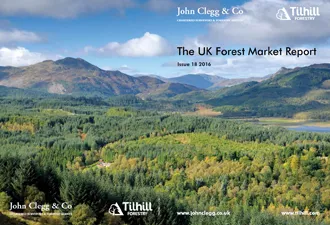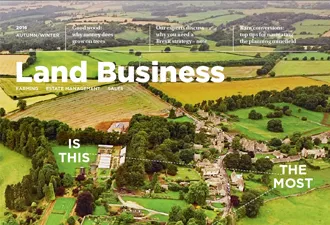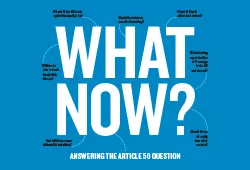

Strutt & Parker has worked with the CLA to produce Rural Business 2030: Unlocking Investment, Unlocking Potential – a new report that explores the possibilities to invest in and grow the landowning sector between now and 2030.

It focuses on three key areas of opportunity: natural capital, energy and connectivity. Here, Strutt & Parker experts discuss the prospects that each area presents.
Natural capital
At present, it can be hard to make a business case for individuals to invest in their natural assets. However, Jason Beedell, Strutt & Parker Research Partner, believes that this is likely to change imminently, as the government looks likely to fail to meet its objectives for the environment – in areas such as wildlife protection, soil management and water quality – without significant investment.
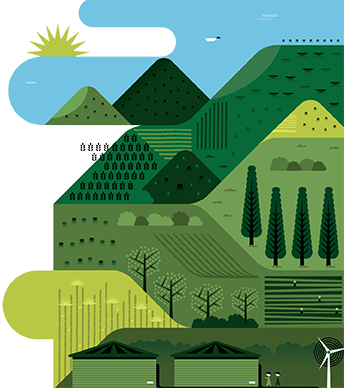
‘What we’re going to find is that the government is probably not going to pay farmers and land managers as much to produce crops in the future,’ he says. ‘It will pay them for producing public goods.’
Beedell is more optimistic about natural capital now than he has been for the past 20 years. ‘What’s quite encouraging is that the government’s thinking feels the right way round,’ he says, explaining that it has asked the Natural Capital Committee to decide what success would look like in 2030 and then work backwards from that. ‘I don’t think the government has thought that way in the past. It is potentially a massive market for landowners.’
Several other factors could also contribute to making it a huge opportunity in years to come. Although the government looks likely to remain the primary customer for natural capital, a number of new potential customers are emerging, such as water companies needing to clean and store water, manufacturers who have to meet carbon targets and organisations who have pledged to improve health by connecting people with nature. The market would also grow if planning applications were required to include biodiversity offsetting.
Beedell believes that leaving the EU could also help natural capital fulfil its potential. ‘Because we’re leaving the Common Agricultural Policy, we’ve actually got more freedom to introduce these policies,’ he says. ‘It’s really exciting and a lot of the building blocks are already in place.’
Jason Beedell | jason.beedell@struttandparker.com
Energy
Rural businesses have invested heavily in renewable energy, but changes in policy have led to questions regarding how the sector can be sustained. Despite recent uncertainty, Alexander Creed, Strutt & Parker’s Head of Energy, remains convinced that it is vital that business owners confront energy issues head-on.
‘The need to understand your energy use, reduce it and manage it in a smarter way – as well as possibly producing some or all of your own energy – is not going away, particularly given the ambitious emissions targets set in the fifth carbon budget,’ he says. ‘It is something that all businesses must tackle.
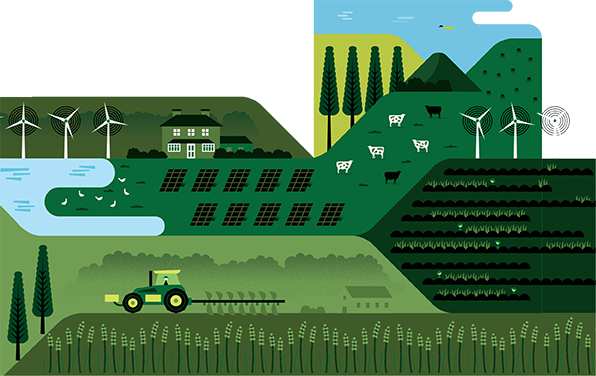
‘Consumer awareness of the environmental impact of a business is becoming ever more important, so demonstrating that you are doing your bit is essential in order to retain customers.’
However, Creed is keen to emphasise that investing in energy also makes sound business sense. ‘When we review the energy use of a business, it is extremely rare that we cannot find cost reductions, or that the cost of taking action exceeds the income generated, so there is an economic case as well.
‘For all business owners – and I include rural estates and farms in this – managing your energy will add value, either through a hard return to your bottom line or through softer means by engaging with your customers and encouraging them to do business with you.’
Looking ahead, Nick Watson, Strutt & Parker Land Management Partner, believes that energy storage has the potential to be revolutionary. ‘One of the biggest changes we will see in our lifetimes will be the ability to store electricity effectively,’ he says. ‘Within the next few decades, most of the cars on the road will be electric and most houses will have a solar array, a heat pump and a battery pack, making them largely self-sufficient.’
For this to become a reality, Watson believes that the equipment has to take that next step in terms of efficiency and that the government needs to provide support to help it become mainstream.
‘There are some very interesting opportunities for landowners around generating and storing electricity, and reselling it to their own occupiers and the wider local community. Some of the regulatory and planning barriers preventing that at the moment need to come down so that landowners and rural businesses can become energy providers in their own right.’
Alexander Creed | alexander.creed@struttandparker.com
Kieran Crowe | kieran.crowe@struttandparker.com
Connectivity
One of the biggest grievances voiced at the launch of the report at the CLA’s Rural Business Conference in December was unpredictable rural broadband. Robert Paul, Head of Strutt & Parker’s Telecoms Group, agrees that mobile and broadband coverage remains a challenge in more remote areas after years of underinvestment.
The introduction of the Universal Service Obligation (USO), which promises basic fixed-line broadband services at an affordable price for all UK citizens, has been hailed a breakthrough, but businesses in rural areas will undoubtedly require speeds greater than 10Mbps to help them achieve their full potential.
Paul has another word of warning regarding the obligation: ‘The USO is great – however, it only seems to refer to rolling out broadband, not to mobile connectivity. A common misconception is that there is an overlap between the two and that “broadband” includes “mobile connectivity”, but they are not the same thing. Businesses and homes cannot operate via broadband alone.
‘Both sides of the equation need to be pushed by the government. There need to be clear targets set for absolute universal coverage across all households, regardless of geographic area, and the operators then need to be held to account for delivery.’
This is currently a piece missing from the puzzle. Paul explains that if the government is determined to improve connectivity in rural areas, it needs to actually enforce the targets it has set. The operators blame the delay on planning laws and landowners being difficult, but Paul sees no evidence of this.
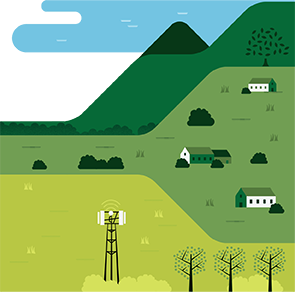
‘The real issue is that they’re not trying – they don’t want to invest in infrastructure in rural areas, preferring the more commercial urban networks,’ he says. ‘Under the new Electronic Communications Code, market value still applies, so the operators’ attempts to reduce rents to mere compensation should be fiercely resisted. In fact, rents continue to increase, and we foresee the need for thousands of new sites in order to provide proper 4G and 5G coverage.
‘However, there’s nothing currently in place to force or incentivise the operators to improve connectivity in rural areas – it won’t happen until the government drives it very hard.’
Strutt & Parker is well placed to help improve rural connectivity, says Paul: ‘If landowners have “not-spots” on their estate or in their locality, we can help to find operators to fill those gaps. Also, if people want assistance with broadband connectivity issues, we can help them to review the different options available.’
Robert Paul | robert.paul@struttandparker.com
Read more
This article originally appeared in Strutt & Parker's magazine, Land Business Spring/Summer 2017. Read the full magazine here.



